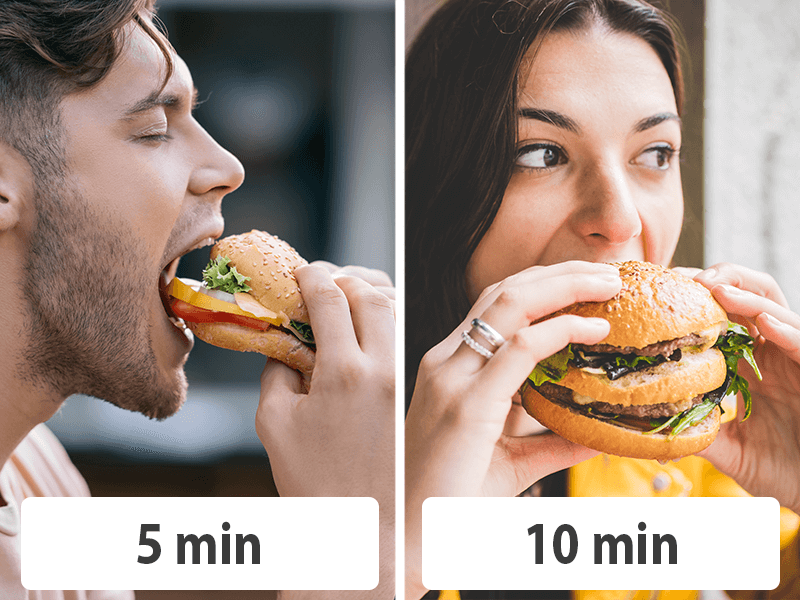
Goal
I can use comparative adverbs with than.
than を用いた副詞の比較級を使うことができるようになる。
Grammar Point
Use than with comparative adverbs to compare how two people, groups, or things do something.
二つのもの(人、グループ、物)がどのように物事を行うかに関して、違いを比較するために、副詞の比較級と than の使い方を学びましょう。-
The form is [comparative adverb] + than. To make a comparative adverb, add -er or -r to most regular one-syllable adverbs.
形は<副詞の比較級+than>です。副詞の比較級を作るには、ほとんどの規則変化する1音節の副詞(発音した時に母音を1つだけ含む副詞)の場合、語尾に -er か -r をつけます。
ONE-SYLLABLE ADVERB | COMPARATIVE FORM |
|---|---|
|
high |
higher |
|
late |
later |
横にスワイプ
I usually drive faster than Vicky.
私は普段ビッキーよりも速く運転します。
My daughter studies harder than my son.
私の娘は息子よりも一生懸命勉強します。
-
For other regular adverbs, add more before the adverb.
上記以外の規則変化する副詞の場合、副詞の前に more をつけます。
OTHER REGULAR ADVERB | COMPARATIVE FORM |
|---|---|
|
smoothly |
more smoothly |
|
efficiently |
more efficiently |
横にスワイプ
I walk more slowly than my friend.
私は友達よりもゆっくりと歩きます。
Donna dances more gracefully than Kyle.
ドナはカイルよりも優雅に踊ります。
Be careful: Some native speakers use informal comparative forms, but they are generally not considered to be correct. Please do NOT use informal comparative forms in this lesson.
CORRECT COMPARATIVE FORM | INFORMAL COMPARATIVE FORM |
|---|---|
|
more quickly |
quicker |
|
more slowly |
slower |
|
more loudly |
louder |
横にスワイプ
I eat quicker than my friend.
I eat more quickly than my friend.
-
Irregular adverbs do not follow the general rules. You have to memorize their comparative forms.
不規則変化する副詞は変化に規則性がありません。比較級を覚えましょう。
IRREGULAR ADVERB | COMPARATIVE FORM |
|---|---|
|
well |
better |
|
badly |
worse |
|
early |
earlier |
|
much/a lot |
more |
|
a little |
less |
|
far |
farther/further* |
横にスワイプ
*no difference in meaning in many contexts
*多くの文脈で意味に違いはありません
You sing better than Mike.
あなたはマイクよりも歌が上手です。
I speak less than my sister.
私は妹よりも口数が少ないです。
-
After than, you can use a noun by itself or a noun with a verb. The meaning does not change. When using a verb, it is common to replace the original verb with do.
than の後には、名詞だけ置くことも、<名詞+動詞>を置くこともできます。どちらを使っても文の意味は変わりません。動詞を置く場合、元の動詞を do に置き換えることが多いです。
I run faster than my sister.
私は姉よりも速く走ります。
I run faster than my sister does.
私は姉よりも速く走ります。
In high school I ran faster than my sister.
高校時代は私は姉より速く走りました。
In high school I ran faster than my sister did.
高校時代は私は姉より速く走りました。
-
You can also use a pronoun after than. Both the subject and object forms of pronouns are grammatically acceptable.** There is no difference in their meaning, but the subject form tends to sound more formal.
than の後には代名詞を置くこともできます。文法的には代名詞の主格、目的格どちらも使用可能です**。意味に違いはありませんが、主格のほうがより丁寧です。
**some native speakers may feel that subject forms are more correct
**英語のネイティブスピーカーは主格のほうが正しいと考える人もいますSUBJECT FORM | OBJECT FORM |
|---|---|
|
I |
me |
|
you |
you |
|
he |
him |
|
she |
her |
|
it |
it |
|
we |
us |
|
they |
them |
横にスワイプ
I run faster than her.
私は彼女よりも速く走ります。
I run faster than she. (formal)
私は彼女よりも速く走ります。 (丁寧)
Be careful: You cannot use the object form of a pronoun with a verb after than. Drop the verb or use the subject form instead.
I run faster than her does.
I run faster than her.
I run faster than she does.

Sentence Builder
She studies harder than John does.
-
Anna dances more gracefully than her friends do.
-
My mom drives more slowly than my dad.
-
Greg wakes up earlier than me.
-
I sing better than my friends do.
-
Mike talks more loudly than Clint.

Practice
Make sentences using the grammar point, the words, and the picture clues. The form of some words may need to be changed.
グラマーポイント、語句、ヒントの写真を用いて文を作りましょう。いくつかの語句は形を変える必要があります。
Ted vs. Emma: eat slowly

-
Sarah vs. her friends: sing badly

-
my cat vs. my dog: jump high

-
Dianne vs. Jack: drink a little

-
she vs. he: dance gracefully

-
Dylan vs. his parents: drive fast

-
my son vs. my daughter: sleep a lot

-
she vs. he: talk loudly

-
my sister vs. my mom: speak English well

-
Brad vs. his daughter: go to bed early

-
AJ vs. Seth: study hard

Q&A
グラマーポイントとご自身についての情報を用いて質問に答えましょう。
-
you vs. your best friend: Who speaks English better?
-
your mom vs. your dad: Who sings worse?
-
you vs. your best friend: Who eats faster?
-
your mom vs. your dad: Who talks more loudly?
-
you vs. your best friend in high school: Who studied harder?
-
you vs. your best friend: Who drinks alcohol more?
-
your mom vs. your dad: Who wakes up earlier?
-
you vs. your friends: Who goes out on weekends more?
-
you vs. your best friend: Who goes to bed later?
-
you vs. your best friend: Who exercises less?

Feedback
I can use comparative adverbs with than.
than を用いた副詞の比較級を使うことができるようになる。LESSON GOAL ACHIEVEMENT
|
4 |
3 |
2 |
1 |
|---|---|---|---|
|
You were able to use the grammar point very smoothly and naturally. Great job! グラマーポイントをとても自然でスムーズに使うことができました。大変良くできました! |
You were able to use the grammar point with minimal difficulty. |
You were able to use the grammar point but struggled a lot. We recommend taking |
You were not able to use the grammar point. Please take the |
PERSONALIZED FEEDBACK
ACCURACY
正確さ文法が正しく使えているかどうか
